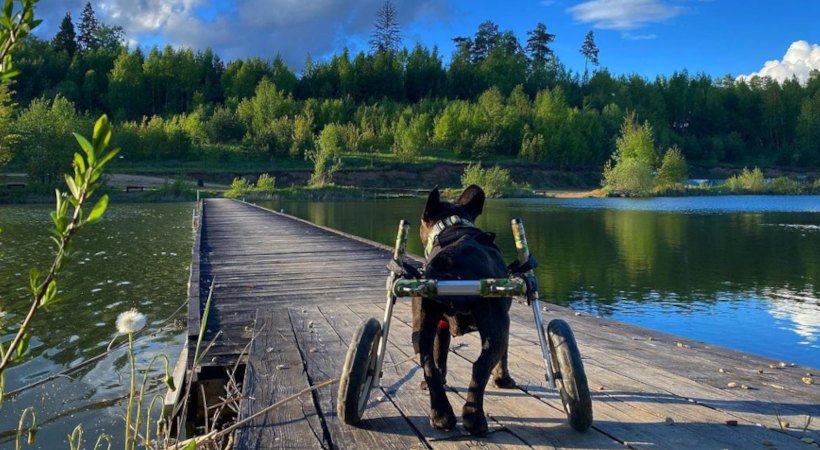Adopting an adult dog can be a wonderful experience and one of the best options for some people and families. Although some say you should witness a puppy’s first few months, adopting an adult dog is no different. The latter allows you to save an adult dog and give him another chance in life.
According to statistics approx 3.1 million dogs are placed in animal shelters annually. And sadly, 390,000 of these shelter dogs are also euthanized each year. While other adult dogs enjoy their golden years with their owners, those at the shelter spend their days in the cage instead, even longer than the younger ones. But when you adopt an adult dog, you save it and make its life better.
In addition, adopting an adult dog also has advantages. Because you can skip the entire puppy stage, you’ll be fostering a dog with a calmer temperament and better manners than the puppies.



What should be considered when adopting an adult dog?
Before you rush out and immediately choose an adult dog, there are a few things you need to know and consider before the big day. You don’t want your newly adopted dog returned to the shelter or foster program because of a lack of preparation and prior research.
So, to get you started, here are five things to consider before adopting an adult dog.
1. Research about different breeds

First, you can explore the different breeds and learn about their characteristics. This will help you discern the type of breed that will best suit you and your family. For example, suppose you are considering going adult Greyhounds (including injured and amputees) available for adoption. They need to learn more about their needs for exercise, nutrition, care and social interaction. And suppose you are considering adopting adult dogs with previous injuries (minor or severe). In this case, you must also research the history of their injuries and their care beforehand.
The more knowledgeable you have about the different breeds, the easier it will be for you to choose and narrow down the list of dog breeds you want to adopt. You can also know what kind of dog accessories to buy to prepare for the arrival of your furry friend.
2. Find the best match
According to resources, um 7% to 20% of adult dogs are returned within six months of adoption. Although there can be various reasons for this, a mismatch is possible.
The best way to prevent this from happening is to take your time and let the shelter staff help you find the best dog that might be a good fit. They can also tell you more about their dogs’ different personalities and energy levels. Additionally, finding the best match is important to ensure your dog fits into your lifestyle or routine. So, use any help you can get from shelter staff or rescue organizations. Some may offer matching programs or provide profile cards that explain each dog’s personality.
3. Know the cost of adoption

Adopting an adult dog is much cheaper compared to buying a pet. Adoption costs can range from $129 to $767, which is a better deal than buying dogs, which can cost thousands of dollars. Adult shelter dogs typically receive veterinary care during their stay — such as spaying or neutering, flea prevention medication, and the like — that are included in the adoption fees.
Whether you are buying or adopting a dog, remember that it should not be an impulse purchase. Adopting an adult dog requires not only emotional and mental preparation, but financial preparation as well. Your adult dog, especially if he has special needs for his injuries, will require you to spend some money on food, vitamins, medication, regular check-ups and vaccinations. You will also have to spend money on wheelchairs or knee braces if necessary.
Once you’ve decided which adult dog you’d like to adopt, ask for a copy of their medical records so you can show them to your pet’s new vet and take care of any remaining health questions.
4. Ask about their dietary needs
The nutritional needs of adult dogs differ from those of younger ones. So if you are at the dog adoption center, you should know more about the specific dietary requirements of the dog you intend to adopt before you bring them home. This will help you determine if you can provide the specific diet and foods the dog needs. Also, don’t forget to ask the shelter staff or a veterinarian about the right food. Some may need to add specific dietary instructions if your new adult dog needs to lose or gain a few pounds.
5. Determine the size of the dog
Adult dogs can vary in size depending on the breed. You might not mind adopting a large adult dog if you have a huge home with a comfortable and enclosed yard. However, if you live in a condo, apartment, or small house with limited space, you must consider the size of the adult dog you are adopting. Likewise, before choosing which adult dog to adopt, it’s best to check the pet policy in your rental property.
key to take away
Like all other dogs, adult dogs need a home and a responsible and loving owner to take care of them. Some may appear shy, aggressive, or fearful, but that’s often because most adult dogs stay in shelters longer than younger ones. But remember that the initial reactions or emotions they show when you first meet doesn’t mean they are bad dogs. In total, Adoption of an adult dog is a great responsibility and a great commitment. It’s a decision that should be made carefully. So if you are adopting an adult dog, keep an open mind. Most importantly, don’t forget to keep these tips and considerations in mind before you take the plunge of bringing home a new adult dog.

Related articles:
[ad_2]


